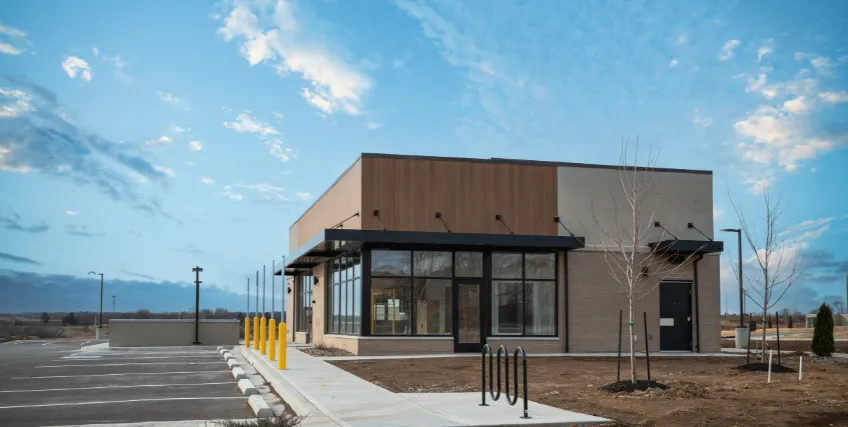Why Loan-To-Value Ratio Matters When Borrowing for Commerical Property in California
April 18, 2025 | Last Updated on: April 18, 2025

A loan-to-value ratio is basically a number that will compare your borrowing amount to the value of your home. If the amount is higher, your LTV ratio will look riskier to the commercial real estate lenders in California, which will result in more expenses for you.
Commercial real estate lenders in California use your LTV ratio to determine the interest rate, loan amount, monthly payment, and whether you must pay for private mortgage insurance.
In this article, we will discuss the importance of LTV in commercial real estate in California and the factors that limit it.
Understanding the Loan-to-Value (LTV) Ratio
Deciding upon the LTV ratio is a crucial element of mortgage underwriting. It can be used while buying a house, or if you want to refinance the present mortgage into a new loan, or borrowing against collected equity within a property, on having a decent cash flow and credit score.
Lenders use the LTV ratio to determine the level of risk exposure they take while underwriting a mortgage. When borrowers demand a loan amount near the appraised value, commercial real estate lenders in California assume that the chances of the loan defaulting are high. This happens because of the low build-up of equity within the property.
This results in the event of foreclosure, where commercial real estate lenders in California may find it challenging to sell the home with an outstanding mortgage balance and make a profit with the transaction in commercial property loan.
Calculating loan to value ratio
Homebuyers can easily estimate their loan-to-value (LTV) ratio using a simple LTV calculator. The formula is:
LTV Ratio = Mortgage Amount ÷ Appraised Property Value
For example, if a home is appraised at $100,000 and you make a $10,000 down payment, you would be borrowing $90,000. Using the formula, your LTV ratio would be:
$90,000 ÷ $100,000 = 0.90, or 90%
The LTV ratio represents the percentage of the property’s value that you’re financing. A lower LTV generally means better loan terms along with loan options, while a higher LTV may result in higher interest rates.
Uses of LTV by the lenders
An LTV ratio is just one factor that helps to determine eligibility when you need to secure a mortgage, line of credit, or short-term home equity loan. However, it can also play a crucial role in the interest rate that a borrower can secure. Commercial real estate lenders in California offer home equity applicants and mortgages at the lowest interest rate when their LTV ratio is 80% or below.
Higher LTV ratios do not exclude borrowers from getting approved for a mortgage. Still, the interest rate on commercial real estate loans in California may increase as the LTV ratio increases.
For instance, a 95% LTV ratio borrower may still qualify for a mortgage. Still, they'll likely face a higher interest rate than someone with a 75% LTV, as the lower-risk borrower is typically rewarded with more favorable loan terms.
When the LTV ratio exceeds 80%, commercial real estate lenders in California often require the borrower to purchase private mortgage insurance (PMI). This insurance typically adds 0.5% to 1% annually to the total loan amount.
For example, on a $100,000 loan, a PMI rate of 1% would cost an additional $1,000 per year or about $83.33 per month. PMI is usually required until the LTV ratio drops to 80% or below. As you continue to pay down the loan and your home's value appreciates, your LTV ratio naturally decreases—potentially eliminating the need for PMI over time.
The scenario usually is that the lower the LTV ratio, the higher the chances of a type of loan getting approved are, with a low interest rate. Moreover, as a borrower, the chances are less that you will purchase private mortgage insurance (PMI).
Although it is not a rule that commercial real estate lenders in California require an 80% LTV ratio for borrowers to avoid any additional cost of PMI, almost every commercial real estate lenders in California follows this practice. There are also some exceptions to this requirement for borrowers with an extensive investment portfolio, high income, and lower debt service coverage ratio.
Factors impacting LTV
Even though your LTV ratio will decrease as you pay more of your mortgage and establish a solid equity in your home, closing purchases of your home with low LTV can put you in a position that is competitive for your future refinancing and other types of borrowing opportunities.
Here are some ways of consideration regarding your LTV ratio of commercial real estate lenders in California that helps with real estate financing:
Home value
If you can get the lowest sales price, it can positively affect your LTV, especially if you are buying a home below its perceived value and can take out a low mortgage in real estate investment. Buying a home above its sales price and asking for a larger mortgage may mean that your LTV should start at a higher ratio than the one that the buyer accepted at a lower bid.
Down payment
If you make a 20% down payment, it will not only allow you to avoid private mortgage insurance but also make sure you start your home ownership journey with an 80% LTV. This will also increase your chances of getting approval for a home equity loan, and construction loans.
Appraised value
If you can maximize the value of your home by improving it, it can help you keep a low LTV, and repayment.
Ways to lower LTV and increase home equity
A lower LTV may keep you competitive, irrespective of the plans for a home equity loan. By now, you must know that the more equity you have, the lower will be your LTV. Below are some ways through which you can lower your LTV in case you are already a homeowner:
Improve your property
You may feel that this is implausible when it comes to home equity loans, which are often used to cater for home improvement projects. But this doesn't mean that this is a huge project for improving the value of your home. You can also depend upon simple things like plumbing, adding insulation, repainting, keeping a check on the wiring, and addressing issues like mold will increase the value of your home and open different financing options.
Address necessary repairs
If you regularly repair your home according to the proper requirements, its value will increase. This will include regular roof repairs, painting, and gutter cleaning, which can potentially enhance your home's value. You can also do any necessary exterior work, like landscaping or paving.
Consider refinancing
If you're able to do so, refinancing your mortgage can be a smart financial move. Transitioning from a 30-year mortgage to a 15-year term may result in higher monthly payments, but it allows you to pay down the principal faster and build home equity more quickly. Additionally, refinancing to lock in a lower interest rate, even for the same term, can significantly reduce the total interest paid over the life of the loan.
Pay more toward the principal
Some mortgages come with payment penalties, but these are easily overcome. If you have a goal to decrease your LTV, windfalls, embarking financial gifts, and any type of bounce toward your mortgage will provide you with more equity in your home and can allow you to lock in the most competitive home equity loan rates.
Final Thoughts
Understanding and managing your loan-to-value (LTV) ratio is essential when dealing with commercial real estate lenders in California. A lower LTV improves your chances of loan approval after the submission of loan application, opens the door to better interest rates, and eliminates the need for private mortgage insurance.
Focusing on strategies like increasing your down payment, improving your property’s value, and paying down your mortgage principal can lower your LTV and strengthen your financial position and appraised value of the property. Commercial real estate lenders in California view lower LTV ratios as less risky, which can lead to significant savings and better loan terms. If unsure before making any financial decisions, it is recommended to speak to a professional.
FAQs about commercial real estate lenders in California
What is a good loan-to-value ratio for commercial real estate?
A strong loan-to-value (LTV) ratio for commercial real estate loans typically falls between 65% and 80%. However, depending on the property type and the loan program specifics, some commercial real estate lenders in California may offer financing up to 80% or even 90%. These higher LTV options are often available for well-qualified borrowers or properties with strong income potential.
What is the maximum LTV for commercial property?
Most banks typically offer a maximum loan-to-value (LTV) ratio of 80% to 90%, based on the lower of the property's appraised value or purchase price.
Why is loan-to-value ratio important?
Lenders use the loan-to-value (LTV) ratio to determine how much you can borrow and the interest rate you'll receive. A higher LTV generally signals greater risk, which can lead to a higher interest rate. By making a larger down payment, you may qualify for a lower LTV and, in turn, a more favorable interest rate.
Is 40% a good loan-to-value ratio?
A strong loan-to-value (LTV) ratio typically ranges from 40% to 75%. Generally, the lower your LTV, the better your chances of securing more competitive mortgage rates. Once your LTV exceeds 80%, you can expect higher interest rates, as lenders view the loan as a higher risk.
What is the ratio of a commercial mortgage?
The Loan-to-Value (LTV) ratio is one of the first metrics commercial lenders evaluate when assessing a loan application. It's calculated by dividing the commercial mortgage amount by the property's market value, as determined through a professional appraisal. For most commercial real estate loans, LTV ratios are typically capped at 75% to 80%, depending on the lender and property type.



